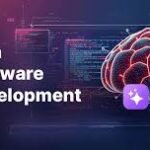AI is changing the way business is done in virtually every field, including software development. AI assists in automating and managing almost every aspect of software development, from writing and reviewing projects to coding, testing, and project management. As a result, it increases productivity, lowers mistakes, and boosts creativity. Developers rely on automated tools that help manage workflows, enhance coding quality, and let creativity take control all at once. It is not only about doing things quicker but also building smarter and more dependable software development solutions.
AI-powered coding assistants
There is probably no greater innovation in AI for software development than AI coding assistants. Examples include CodeWhisperer, Tabnine, and GitHub Copilot. These tools help developers complete code definitions, write code, or even build an entire piece of software with clear instructions. They suggest relevant code snippets as needed and can automatically complete blocks of code.
AI coding assistants also automate repetitive tasks, allowing developers to focus on logic rather than writing every line. Additionally, these tools recommend best practices for junior coders, helping them write higher-quality code and reducing the experience gap.

Automated Testing and Debugging
Testing and debugging require developers to exercise great care for detail and can be very tedious. In order to increase productivity, AI is optimizing these procedures by automating error detection, optimizing test cases, and anticipating vulnerabilities that might occur after deployment.
AI-Powered Testing Tools
Tools that automate testing, such as Testim, Applitools, and Mabl, leverage AI’s machine learning capabilities to automate software testing processes. These tools have the potential to detect UI inconsistencies, analyze code behavior, and find bugs more rapidly compared to the traditional methods. As AI can adapt to code changes, it significantly minimizes false positives, which ensures more accurate test results.
One other benefit of AI-based powered testing is its ability to predict issues based on historical data. AI-powered code review systems can highlight areas of code that, based on past bugs and user reports as they usually have a higher chance of causing errors, making it easier for developers to solve them before they escalate.
Debugging using AI
AI-powered debugging systems like DeepCode and Bugzilla have made nearly impossible tasks seem effortless by studying and intelligently recommending solutions for complicated pieces of software. With the help of such systems, hands-on interactions with users are simulated in order to locate possible performance glitches as well as security risks long before they develop severe consequences.
Through the automation of program error detection processes, AI speeds up the software developmental phases while improving application safety and dependability.
Project Management Tools With AI
With the help of AI, more efficient software development is within reach, which helps in swift progress in project management. The project managers are aided by machine learning through predictive techniques in analysis, restructuring of workload, team integration, and active allocation of resources for improved productivity.

Automation and Assignment of Responsibilities
Artificial intelligence-powered platforms such as ClickUp, Asana, and Jira utilize AI to assign responsibilities and track activity levels of each individual or team while prioritizing work that requires immediate attention. These systems enhance productivity by offering precise suggestions based on data from previously completed projects, including deadline extensions and other proposed changes designed to eliminate inefficiencies.
Analytics as a Guide to Project Success
AI is capable of predicting potential holdups and risks by checking the history of software development processes. Predictive analytics serve as a guide for project managers with potential issues, resource allocation, and decision-making. This increases the chances of avoiding project overruns while ensuring smoother execution.
Use of AI in software development
NLP-based AI assistants, like Microsoft’s Cortana and Slack’s AI bot, help breakdown construction communication barriers. They summarize the meetings, flag important conversations, and even provide intelligent recommendations to the discussed problems. AI-powered chatbots assist in unlocking adequate decision-making by offering instant insights into project positions.
Software development teams are able to work more effectively, free up bottlenecks, and have more control over their deadlines and commitments with the help of AI-powered project management.
Ethics and Possible Developments while using AI in software development
The role of AI technology in software development keeps changing, and its impact is expected to grow every year. Today’s trends suggest a prominent future role of AI as the supervisor for coding, testing, and management of projects.
Ethical Considerations
Ethics have become more important than ever in this era, while dealing with advanced technology, there are following factors that need to be considered.
Bias in AI Models: Assistants and automated testers are, by default, based on AI. They are fired because their underlying dataset is biased. In order to solve this problem, AI needs training data that is a large scale and diverse drama.
Job Displacement Concerns: Productivity goes up with AI. However, it also means less work for software developers, which is a valid concern. In reality, AI will most likely arm without disarming developers by taking over boring, repetitive work.
Security and Data Privacy: The increase in the monitoring granted by AI tools can expose sensitive information. Proper AI-assisted tools will have to be blocked by design to ensure sensitive information cannot be accessed freely.
Conclusion
The development of artificial intelligence is bringing the usage of AI-based coding assistants, software testing automation, and clever project management tools. These innovations increase productivity, make the work of developers easier, and improve the quality of the software developed. Nevertheless, with the evolution of AI, a concern remains for software developers regarding the ethical practices of AI application and implementation.
Advancements of AI in software development in the future range from self-healing codes to software that writes algorithms on its own. AI alone cannot replace the creativity and the ability to solve problems brought by humans, but it will always be an important asset when working towards the next generation of software development tools.
For availing our services and more details, visit our website and contact us. Also, you can check our portfolio and see how can you get benefited.





